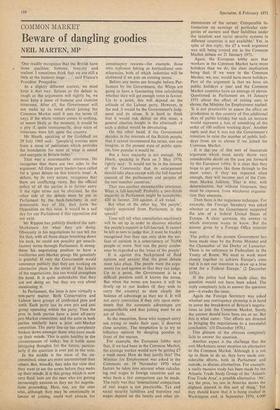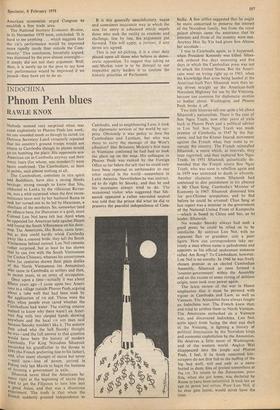COMMON MARKET
Beware of dangling goodies
NEIL MARTEN, MP
`One readily recognises that the British have • three qualities; humour, tenacity and realism. I sometimes think that we are still a little at the humour stage .. .', said France's President Pompidou.
In a slightly different context, we must keep it that way. Serious as the debate is, tough as the arguments will rightly be, we must keep a sense of humour and exorcise bitterness. After all, the Government will not make up its mind about joining the Common Market until it sees the terms (if any). If the whole venture comes to nothing, as seems likely at the moment, it would be a pity if, quite unnecessarily, deep scars of bitterness were left upon the country.
Mr Heath, speaking at the Guildhall on 29 July 1969 said : `[people's] worries stem from a sense of patriotism which provides the foundation for most of what is sound and energetic in Britain today.'
That was a statesmanlike utterance. He recognises that there are two sides to the
argument. All three party leaders have called for a 'great debate on this historic issue'. A debate, by its very nature, recognises that there are conflicting views. But the official policy of all the parties is to favour entry if the right terms can be obtained. So the . other side of the debate must be put in Parliament by the back-benchers; in our ,democratic way of life, they form the Opposition on this issue. It would be a sad day for our Parliament if this opposition did not exist.
Mr Rippon has publicly thanked the anti- Marketeers for what they are doing. Obviously in his negotiations he can tell the Six that, with all those chaps breathing down his neck, he could not possibly get unsatis- factory terms through Parliament. It streng- thens his negotiating position to have a vociferous anti-Market group. He genuinely is grateful. If only the Government would announce publicly that they are working on alternative plans in the event of the failure of the negotiations, this too would strengthen his hand. It is quite unthinkable that they are not doing so; but they are -coy about mentioning it.
In Parliament, the issue is now virtually a non-party matter. Both Conservative and Labour have groups of confirmed pros and antis. Each party has its own pro and anti group operating within the party. Then the pros in both parties have a joint all-party pro-Market committee; and the antis in both parties similarly have a joint anti-Market committee. The party line-up has completely broken down amongst those who have made up their minds. This is quite healthy in the circumstances of today; but it holds some intriguing thoughts for the future, particu- larly if the question is ever put to the vote.
In the middle is the mass of the un- mmmitted; some are more uncommitted than others. But, broadly, they take the view that they want to see the terms before they make up their minds. It is this group which is now very fluid; here are the ones who are getting increasingly anxious as they see the negotia- tions proceeding. Here, too, are the ones who, although they may be emotionally in favour of joining, could well abstain for
constituency reasons—for example, those who replesent fishing or horticultural con- stituencies, both of which industries will be clobbered if we join on existing terms. Before any terms are brought before Par- liament by the Government, the Whips are going to have a fascinating time calculating whether they will get enough votes in favour.
• Up to • a point, this will depend on the attitude of the Labour party. However, in the end, it would be the Government's judg- ment and its alone. It is hard to think that it would risk defeat on this issue; a general election fought in the aftermath of such a defeat would be devastating.
On the other hand, if the Government decides, in the interests of the British people, that it cannot recommend the terms, one can imagine, in the present state of public opin- ion, how popular it would be.
But a bare majority is not enough. Mr Heath, speaking in Paris on 5 May 1970, rightly said: 'It would not be in the interest of the Community that its enlargement should take place except with the full-hearted consent of the parliaments and peoples of the new member countries.'
That was another statesmanlike utterance. What is full-hearted? Probably a two-thirds majority in Parliament might be acceptable; 420 in favour, 210 against, if all voted.
But what of the other leg, 'the people', rightly separated from Parliament in the speech?
Time will tell what consultative machinery will be set up in order to discover whether the people's support is full-hearted. It cannot be left to Nips to judge this; it must be frankly recognised that they can only skim the sur- face of opinion in a constituency of 70,000 people or more. Nor can the party confer- ence be regarded as the 'voice of the people'.
It is against this background of fluid opinion and anxiety that the great debate must take place. The people want the argu- ments for and against so that they can judge. Up to a point, the Government is in a difficult position until it knows the terms. But when the terms are known it will be firmly up to our leaders (if they wish to carry the country) to state clearly the balance of advantage as they see it. It will not carry conviction if they rely upon state- ments that the economic advantages are unquantifiable and that joining must be an act of faith.
In the meantime, those who support entry are trying to make their case; it deserves close scrutiny. The temptation is to try to influence opinion by dangling goodies in front of the masses.
For example, the European lobby says that, if we had been in the Common Market, the average worker would now be getting £7 a week more. How do they justify this? The Minister for Employment was asked in the Commons on 19 November 1970 what factors he takes into account when calculat- ing real wages in foreign countries and on what basis a fair comparison can be made. The reply was that 'international comparison of real wages is not practicable. Tax and social security liabilities and therefore real wages depend on the family and other eft-
cumstances of the earner. Comparable in- formation on earnings of particular cate- gories of earners and their liabilities under the taxation and social security systems in different countries is not available.' Yet, in spite of this reply, the £7 a week argument was still being trotted out in the Common Market debate on 21 January 1971.
Again, the European lobby says that workers in the COmmon Market have more holidays than we do, the clear implication being that, if we were in the Common Market, we, too, would have.more holidays. Part of the argument is that we have six public holidays a year and the Common Market countries have an average of eleven. Questioned in Parliament on 14 January 1971 about the effect of raising ours to eleven, the Minister for Employment replied: `It is not practicable to assess the effect on production in this country of five additional days of public holiday but such an increase would represent a loss of something of the order of 100 million working days'. Another reply said that it was hot the Government's intention to raise the number of public holi- days -from six to eleven if we joined the Common Market.
„ It is the -use of this sort of inaccurate argument which must surely throw very considerable doubt on the case put forward by the European lobby. It is clear that they hope to get points like these through to the mass voter; if they are repeated often enough, they will become part of the Com- mon Market folklore. That is why, with determination, but without bitterness, they must be exposed, from whichever organisa- tion they emanate.
Then there is the vagueness technique. For example, the Foreign Secretary was asked whether or not the Government supported the aim of a federal United States of Europe. A clear question, the answer to which everyone wants to know. But the answer given by a Foreign Office minister was: 'The policy of the present Government has been made clear by the Prime Minister and the Chancellor of the Duchy of Lancaster. There is no reference to Federalism in the Treaty of Rome. We want to work more closely together to achieve Europe's aims but it is not our intention to draw up a blue print for a Federal Europe.' (2 December 1970.) If the policy had been made clear, the question would not have been asked. The reply completely fails to answer the question put—it evades the issue.
Again the Foreign Secretary was asked whether any contingency planning is in hand to cover the breakdown of Britain's negotia- tions to join the Common Market. Surely the answer should have been yes or no.' But this is what came: 'Our efforts are directed to bringing the negotiations to a successful conclusion.' (10 December 1970.) This glimpse of the obvious completely fails to answer the question.
Another aspect is the challenge that the anti-Marketeers never mention an alternative to the Common Market. Although it is not up to them to do so, they have made con- siderable efforts, both in Parliament and outside, to discuss alternatives. For example, a really massive study has been made by the Atlantic Trade Study Group of the 'Atlantic Free Trade Area', a possible alternative. `Ah', say the pros, 'no one in. America shows the slightest interest in this sort of thing.' Yet they should know that it is being studied in Washington and, in September 1970, 4,000
American economists urged Congress to establish a free trade area.
The National Institute Economic Review, in its November 1970 issue, concluded: 'It is hard to see anything . . . which suggests that the Ines performance would be improved more rapidly inside than outside the Com- munity.' This conclusion, forcefully argued, was dismissed by the pros almost overnight-- it simply did not suit their argument. Well, then, it is surely up to the pros to say how our performance would be improved if we joined—they have yet to do so. It is this generally unsatisfactory, vague and sometimes inaccurate way in which the case for entry is advanced which impels those who seek the reality to examine and challenge, line by line, the arguments put forward. This will apply, a fortiori, if any terms are agreed.
This is not nit-picking, it is a clear duty placed upon all those who believe in demo- cratic opposition. To suggest that taking an anti-Market view is to be disloyal to our respective party leaders is to confuse the historic priorities of Parliament.



































 Previous page
Previous page